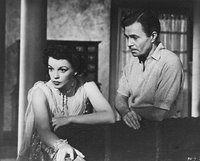9.28.2006
Need a Good Smile, Laugh, or Cry?
This video made me sob like a baby. Sad sobbing, happy sobbing. Not even sure how it triggered the downpour. Something about how afraid we all are so much of the time. Distrustful, isolated, cynical.
In particular, we're so afraid to touch. Afraid that people are lechers who'll steal something from us, pickpockets, mentally ill. No question, I sometimes fall prey to this, too. Though I'd absolutely hug someone with a "Free Hugs" sign. As long as they didn't push religious literature on me.
This also reminds me of a documentary I saw years ago about middle-class women who'd been dumped by their husbands for younger women. They talked about wanting to be desired, just longing to be touched. They banded together and hugged each other.
9.27.2006
Reconsidering Judy Garland
 For the book I’m writing on gender in the films of George Cukor, I’ve recently spent a lot of time contemplating the film A Star is Born and the career of Judy Garland. I’ve never been a big fan, having generally been annoyed by her girl-next-door persona in the Andy Hardy films with Mickey Rooney, and finding her equally offputting as an adult in sappy flicks like Easter Parade. Despite being a person given to (feminist) critical analysis, I hadn’t really thought about the fact that Garland herself might not have wanted to be this hyper-earnest trifle of an actress. Certainly, the power of her voice exceeds the characters she mostly played at every opportunity. And she looks physically awkward often, like she has neurotic tics, especially in adulthood.
For the book I’m writing on gender in the films of George Cukor, I’ve recently spent a lot of time contemplating the film A Star is Born and the career of Judy Garland. I’ve never been a big fan, having generally been annoyed by her girl-next-door persona in the Andy Hardy films with Mickey Rooney, and finding her equally offputting as an adult in sappy flicks like Easter Parade. Despite being a person given to (feminist) critical analysis, I hadn’t really thought about the fact that Garland herself might not have wanted to be this hyper-earnest trifle of an actress. Certainly, the power of her voice exceeds the characters she mostly played at every opportunity. And she looks physically awkward often, like she has neurotic tics, especially in adulthood.So, reading about Garland in A Star is Born, including the history of the film and how Garland ended up making it, as well as more contemporary critical study (including key works by Richard Dyer on gay men’s relationship with Garland), has led me to rethink the ease with which I dismissed Garland because watching her always made me uncomfortable.
A Star is Born is a film in which Garland’s discomfort is visible in every frame, in part because the film is so (intentionally) autobiographical and because the pressure was on: encouraged by her then-husband, producer Sidney Luft, she made the film as a come-back after having her contract canceled with MGM. This film was to show the “real” Garland, the power of her voice and acting, addressing the evils of the Hollywood studio system and its pressures on actors to be more machine than human.
Certainly, the power is there. When Garland sings “The Man that Got Away,” arms shooting out in all directions and the improvisational feel absolutely tangible, her belt is enough to shake the rafters in a way I can only envy and adore.
Yet, even as the film sells authenticity like a hot stock tip, there is the usual Hollywood artifice all over this film. That belted voice is taped then mouthed by Garland in the actual film, however strong the song seems. In many scenes, she is corseted and forced into ridiculous gowns and dresses to produce that starlet look, even as the film critiques Hollywood’s beauty norms and demands of its stars.
Most compelling to me as I analyzed all of this while rescreening the film was an article entitled “Feeling and the Filmed Body: Judy Garland and the Kinesics of Suffering” by Adrienne L. McLean from Film Quarterly. McLean analyzes Garland’s quirky and neurotic-seeming body movements and their relationship to the way her body was controlled and filmed. She argues, “The signs of Garland’s neurosis and pain not only appear in but are in no small measure caused by the struggles of her body and temperament to adapt to the demands made upon them over time by the visual conventions of women’s stardom itself.” Read the rest of the article here yourself to appreciate the rich analysis of her singing style, her dancing, and her movements in general as they relate to the demands of Hollywood. Truly engaging stuff.
Now, you may already know that Garland was heavily corseted for her role in The Wizard of Oz. The post-pubescent Garland had to be rendered pre-pubescent for the film. And such control and youthening happened to her throughout her young adult career. Her hair was dyed and she was heavily made-up, always. She was even made to wear nasal prosthetics to remove some of the pugness of her nose. Garland also had scoliosis, so she was only allowed to be filmed from certain angles that would not show a hunch in her back. As a more mature adult, she continued to be heavily corseted as she gained weight. She was under 5’ tall, so she always had to be made to look longer and less short-waisted. McLean makes plain that the short, stocky top/middle-heavy body of Garland is perfect for projecting the powerful voice she had. Instead, her body was controlled and regulated by norms that both hampered her movement and made her look awkward and neurotic when trying to use her body to belt those amazing songs. There simply was no acknowledgement of the fact that some people just don’t look like pointy-nosed hourglass models of Hollywood femininity—and of course that is still true today.
I can only imagine what that kind of manipulation of one’s body does to one’s sense of self and self-esteem. Clearly, the diet pills and the alcoholism and the suicide attempt make that plain.
I always knew Garland was a victim of her stardom, but now I know more fully why I cannot watch her act like the perfect American sweetheart in those Andy Hardy films or as the Plain Jane in need of transformation in Easter Parade. I feel badly that I was suckered into misreading distress for complacency in her performances. And I’m glad to have another perspective now.
9.18.2006
Fresh Air was Stale Today
9.09.2006
Jerry Springer Made Me Happy?
Doing dishes and tidying the livingroom this morning, I put on Air America Radio as background entertainment. My general experience of the station is a repeated chant of "preaching to the choir" without much content or opinion I didn't already know or believe. The station also, of economic necessity, has dreadful repetitive annoying cheaply made commercials for annoying products and services I (and the bulk of the Left listening, I venture to say) do not want or need.
But there is value in preaching to the choir, at very least as balance to the dreadful preaching to the choir of Right-wing talk radio. It can be good to hear an "official" media voice reflect my perspective. It can be refreshing to hear dozens of callers phone in and none of them lament the lack of prayer in school, celebrate the greatness of owning guns, cheer on the destruction of the environment, or champion Mr. Bush's handling of Iraq, Katrina, or anything else he's "handled." And this is true even when the callers are as rhetorically ineffective as their Right-wing counterparts, because it reminds me that there actually are progressive bubbas out there.
Today I happened in upon the Jerry Springer radio show. It was the usual banter and series of repetitive callers and it felt as superficially comforting as always. But then Springer told one caller that things would turn around, and soon. I'm used to this line and to continuing to wait for the Democrats or a truly progressive third party to emerge and be the voice of the 70+% of this country who are well and truly sick unto death of every word that comes out of Bush, Rice, Cheney, and the rest of the current administration. I keep being told that the next election it will all change, but I'm still reeling from just how many people have taken so many years to see through the evil (and I don't use that word lightly) that is going on in Washington -- largely by Republicans but also by Democrats. And how many people (even if only 30+%) still have any confidence in "W." and his cronies.
But, somehow, Springer's words still penetrated my pessimistic and justly cynical mind. He said, simply, "Progressives always win." And, thank heavens, that actually is, relatively speaking and with multiple qualifications, true. Emancipation of the slaves did take place. Women do have the right to vote. Integration was made law. We do have a social security system. We do have some healthcare for the poor. One can join a union. I can write this blog, critical of the president, without being imprisoned. Again, all this is relative: I could write many times the number of sentences above about injustices and wrongs that have not and may never be addressed, both related to the rights above and to many other vital issues. I do realize all that. But, in the end, I do believe that progressives do move us forward in this country, however long and rocky the road, however many times we get one step forward and two steps back. It will not be soon enough, but sooner or later gay marriage will be a national right, we will have a liberal woman president and/or a president of color, the corporate capitalist mindset will give way to true democracy. I just hope I'm alive to see all of this and more and cheer it on with equal gusto to the deep sorrow and anxiety I feel about the state of the nation -- and most of the world -- right now.
However odd it is that Jerry Springer is on Air America saying "Progressives always win," I thank him for reminding me.

